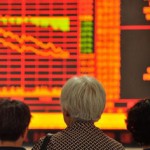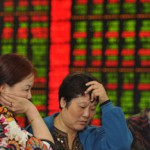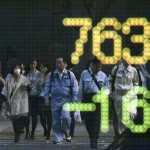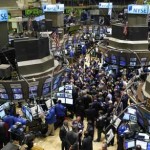Asian markets trade lower, China bucks trend on IPO reform news
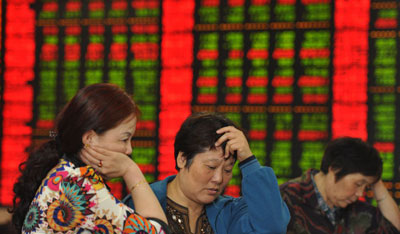
Chinese stocks bucked a generally downward trend in Asian markets on Thursday to trade in positive territory after news broke that Beijing will finally introduce much-need IPO reforms.
Oil prices, which remain under pressure due to a global supply glut, stayed in focus in commodity-heavy markets such as in Australia.
West Texas Intermediate (WTI) crude futures, traded in the U.S., were up 26 cents or 0.73 percent at $37.43 a barrel while the internationally traded Brent futures were trading 35 cents or 0.87 percent higher at $40.46 in Asian afternoon trade.
Overnight, oil prices briefly ticked up after the U.S. government’s Energy Information Administration (EIA) said crude inventories in the country fell – by 3.6 million barrels – for the first time after a 10-week stockpile build-up, before closing lower.
U.S. markets finished in the red. The Dow Jones Industrial Averagegave up triple-digit gains to close 76 points or 0.43 percent lower at 17,492. The S&P 500 was down 16 points or 0.77 percent at 2,047, while the Nasdaq finished lower by 75 points or 1.48 percent at 5,023.
On the data front, the central bank in New Zealand was the latest to cut rates, reducing its discount rate by 25 basis points to 2.5 percent as per expectations early this morning.
ASX closes 3-week low, despite strong jobs report
The Australian stock market closed on a three-week low despite a strong jobs report. The ASX 200 finished down by 43 points or 0.84 percent at 5,037, with most sectors ending in negative territory.
On Thursday the Australian Bureau of Statistics reported that the November unemployment rate in the country fell to 5.8 percent in, 0.1 percent lower from the month before.
The total number of jobs the economy created was 71,400, beating market expectations of a decline of more than 10,000. The majority of the jobs were created in non-mining sectors.
Craig James, chief economist at Commonwealth Securities said in a note “the last time jobs rose by more than 120,000 in the space of two months was 28 years ago.”
On the back of the news, the Australian dollar traded higher against the greenback, as investors expected the strong jobs report would spur the Reserve Bank of Australia to hold rates steady, for now.
But the market was not fully convinced.
Major banking stocks trimmed morning losses but still ended in the red. Shares in ANZ down 0.91 percent, Commonwealth Bank of Australiadown 1.93 percent, Westpac down 2 percent, and the National Australia Bank traded 1.83 percent lower.
Resources producers had mixed fortunes.
Shares in Rio Tinto and BHP Billiton, Australia two biggest miners, were up 2.4 and 1.86 percent after both companies saw their ADRs soar in New York overnight. This, Evan Lucas, market strategist at spreadbetter IG, suggested, could see “some respite from the sustained selling today for the ASX listings.”
However, in the afternoon, iron ore producers saw noticeable sell-offs, after prices for iron ore for immediate delivery to China’s Tianjin port fell 1.3 percent to $38.30 a tonne. Shares in Fortescue, Mount Gibsonand Atlas Iron were down 1.37, 2.78, and 5.88 percent.
Energy plays had a mixed session. Shares in Santos closed up 0.57 percent while Oil Search and Woodside Petroleum were down 1.1 and 0.67.
Chinese markets up as Beijing announces IPO reforms
Chinese markets bucked downward trends in Asia, trading higher as investors digested news of long-anticipated initial public offering (IPO) reforms in the country.
The Wall Street Journal reported that in March 2016 Chinese regulators would introduce new rules for IPO listings. Companies could then list in the Shanghai and the Shenzhen composites under the new rules from May. The report said that right now about 670 companies were waiting for government approval to go public.
The Shanghai Composite was up 6.6 points or 0.19 percent at 3,479 while the smaller Shenzhen Composite was up 6 points or 0.27 percent at 2,220.
Earlier, the People’s Bank of China (PBOC) set the midpoint rate for the yuan at 6.423 per dollar, lower than Wednesday’s rate. The spot rate is allowed to trade in a range of 2 percent above and below this fixed rate.
China’s foreign exchange regulator said in a news conference held by the State Administration of Foreign Exchange (SAFE) that modest falls in the country’s foreign exchange reserve can be tolerated and that there was no basis for large yuan depreciation.
The yuan traded at 6.437 against the dollar in the afternoon session.
Shares in brokerages saw noticeable buy-ins in early trade and continued to trade higher. Shares in Citic Securities was up 2.3 percent,Huatai Securities up 2.79 percent, and China Merchants was up 2.7 percent.
Banks and energy plays were also in mostly positive territory.
Shares in Chinese automakers were down between 0.59 and 1.83 percent in morning trade.
Heavy smog in Beijing is giving a boost to China’s nascent electric car market. The government issued a “red alert” for pollution on Monday and put out measures to limit the use of petrol-powered cars.
Reuters said electric car makers reported greater inquiries from potential buyers, dealers, and automakers.
Nikkei nears 19,000 threshold; Kospi trades flat
The Japanese market moved closer to the 19,000 threshold as theNikkei 225 traded 227 points or 1.18 percent lower at 19,073.
Major exporters including Toyota, Honda, Panasonic, and Sony all traded in the red .
Shares in index heavyweights Fast Retailing and robot-maker Fanucwere down over 2 percent, while major banks such as Mitsubishi UFJ Financial Group, Sumitomo Mitsui Trust Holdings, and Mizuho Financial Group traded lower between 0.12 and 0.8 percent.
The yen traded at 121.62 against the dollar.
Shares in Toshiba were up 1.55 percent after the Nikkei business daily reported the company, undergoing major restructuring since an accounting scandal earlier this year, would sell TV businesses in some countries, including Indonesia. The report said Toshiba may also exit the Japanese TV market entirely. Toshiba said no formal decision had been made.
The Seoul Kospi was down 6.14 points or 0.35 percent at 1,941.
The Bank of Korea (BOK) kept its main interest rate steady at 1.5 percent, in line with analyst expectations. Rates have sat at this record low for half a year.
Reuters reported in a press conference Governor Lee Ju-yeol said low oil prices and global sluggishness were among the downside risks facing the South Korean economy.
The Korean won traded 1177 against the dollar.
Retail shares traded mixed as South Korea’s version of Black Friday continued. The K-Sale Day, which kicked off two weeks ago and will run for a total of 26 days, is a period where retailers offer huge discounts on products to clear inventories.
Shares in Lotte Shopping and Shinsegae traded up while Samsung C&Tand Hyundai Department Store were down.
Blue chip companies such as Samsung Electronics and Posco also traded in the green.
Source: CNBC – Asian markets trade lower, China bucks trend on IPO reform news










